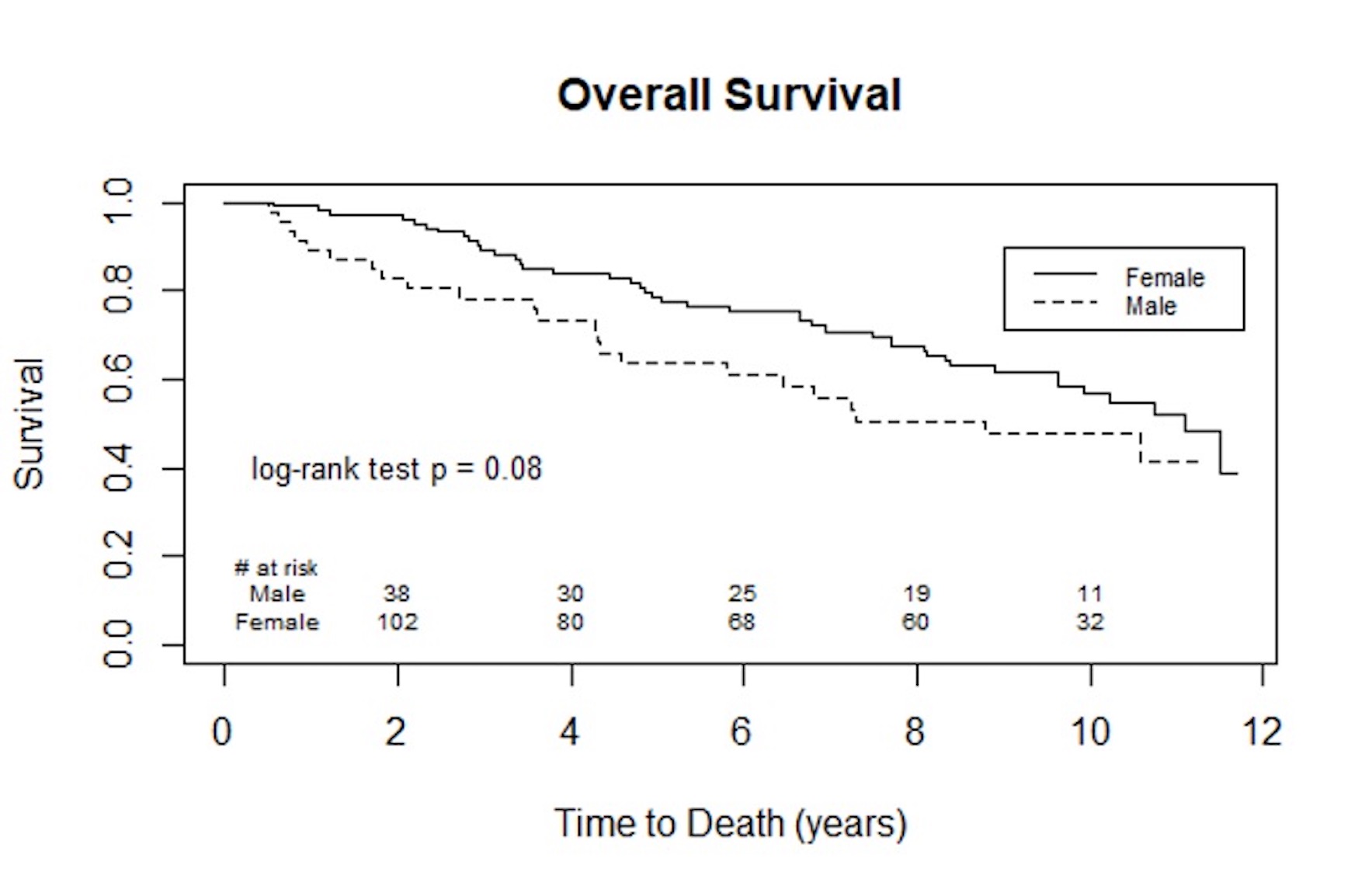Session Information
Session Type: Poster Session A
Session Time: 9:00AM-11:00AM
Background/Purpose: Although systemic sclerosis (SSc) disproportionately affects females compared with males [1], observational studies have demonstrated higher mortality rates in males with SSc [2]. This may be due to a higher prevalence of interstitial lung disease (ILD) in males [2], or external factors, such as delayed SSc diagnosis in males. The objective of this study was to compare short- and long-term outcomes of male and female participants of two RCTs for SSc: Scleroderma Lung Studies (SLS) I [3] and II [4].
Methods: SLS I randomized 158 SSc participants (47 Males) with ILD to 1 year of oral cyclophosphamide (CYC) versus placebo, followed by 1 year off treatment. SLS II randomized 142 SSc-ILD participants (37 Males) to 1 year of oral CYC, followed by 1 year of placebo, versus 2 years of mycophenolate (MMF). Both studies measured the FVC every 3 months during the study and performed HRCT scans at baseline and 12 (SLS I) and 24 (SLS II) months. Up to 12 (SLS I) and 8 (SLS II) years after randomization, we assessed morbidity and mortality outcomes. Joint models evaluated progression of ILD based on the course of the FVC and linear regression models evaluated radiographic changes in ILD. We compared survival using a log-rank test and used Cox proportional hazard modeling to determine the variables associated with survival.
Results: Baseline demographic and disease characteristics were similar for males and females of SLS I and II, with the exception of a higher prevalence of Caucasians in SLS I males (79% versus 58%, respectively). Additionally, males demonstrated more restrictive physiology in SLS I (lower FVC, TLC, DLCO) and II (lower DLCO) compared with females. In the placebo arm of SLS I, there was a trend for increased worsening of the FVC in males compared with females from 3 to 12 months (P=0.14). In the CYC arm of SLS I, there was no difference in the course of the FVC from 3 to 12 months (P=0.84). In the CYC arm of SLS II, males experienced a decline in the FVC from 3 to 12 months, whereas females experienced an improvement (P=0.0006). In the MMF arm of SLS II, males experienced less of an improvement in the FVC from 3 to 12 months compared with females (P=0.005). In SLS II (but not SLS I), males had increased radiographic progression of ILD based on quantitative imaging analysis, even after adjusting for treatment arm. Long-term survival was worse in males compared with females in both SLS I and II (Log Rank Test: P=0.08, P=0.03, respectively). After adjustment for baseline disease severity (FVC, skin score) and age, male sex was independently associated with increased mortality compared with females in SLS II (HR 2.42; P=0.01), but not SLS I (HR 1.14; P=0.63).
Conclusion: Data from two large RCTs in SSc-ILD demonstrated that males with SSc-ILD had evidence of increased ILD severity at baseline. Males also appeared to have increased progression of ILD both with and without treatment, as well as worse long-term survival. These findings are consistent with prior observational studies, and future studies are needed to understand the genetic and hormonal underpinnings for these important sex differences.
References
- Steen, et al. Arthritis Rheum 1997.
- People, et al. J Scleroderma Relat Disord. 2016.
- Tashkin, et al. NEJM 2006.
- Tashkin, et al. Lancet Resp Med 2016.
 Figure 1. Time to death in males (dotted line) versus females (solid line) in SLS I.
Figure 1. Time to death in males (dotted line) versus females (solid line) in SLS I.
 Figure 2. Time to death in males (dotted line) versus females (solid line) in SLS II.
Figure 2. Time to death in males (dotted line) versus females (solid line) in SLS II.
To cite this abstract in AMA style:
Volkmann E, Li N, Roth M, Feghali-Bostwick C, Silver R, Baker Frost D, Assassi S, Kim G, Goldin J, Tashkin D. Sex Differences in Severity and Progression of Interstitial Lung Disease in Systemic Sclerosis: What We Have Learned from Clinical Trials [abstract]. Arthritis Rheumatol. 2020; 72 (suppl 10). https://acrabstracts.org/abstract/sex-differences-in-severity-and-progression-of-interstitial-lung-disease-in-systemic-sclerosis-what-we-have-learned-from-clinical-trials/. Accessed .« Back to ACR Convergence 2020
ACR Meeting Abstracts - https://acrabstracts.org/abstract/sex-differences-in-severity-and-progression-of-interstitial-lung-disease-in-systemic-sclerosis-what-we-have-learned-from-clinical-trials/
